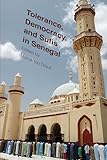Tolerance, Democracy, and Sufis in Senegal / ed. by Mamadou Diouf.
Material type: TextSeries: Religion, Culture, and Public Life ; 15Publisher: New York, NY : Columbia University Press, [2013]Copyright date: ©2013Description: 1 online resource (296 p.)Content type:
TextSeries: Religion, Culture, and Public Life ; 15Publisher: New York, NY : Columbia University Press, [2013]Copyright date: ©2013Description: 1 online resource (296 p.)Content type: - 9780231162630
- 9780231530897
- 297.409663 23
- BP64.S4 T65 2013
- BP64
- online - DeGruyter
- Issued also in print.
| Item type | Current library | Call number | URL | Status | Notes | Barcode | |
|---|---|---|---|---|---|---|---|
 eBook
eBook
|
Biblioteca "Angelicum" Pont. Univ. S.Tommaso d'Aquino Nuvola online | online - DeGruyter (Browse shelf(Opens below)) | Online access | Not for loan (Accesso limitato) | Accesso per gli utenti autorizzati / Access for authorized users | (dgr)9780231530897 |
Frontmatter -- Contents -- Acknowledgments -- Abbreviations -- 1. Introduction: The Public Role of the "Good Islam": Sufi Islam and the Administration of Pluralism -- 2. A Secular Age and the World of Islam -- 3. Islam's New Visibility and the Secular Public in Senegal -- 4. Dakar's Sunnite Women: The Dialectic of Submission and Defiance in a Globalizing City -- 5. Sovereign Islam in a Secular State: Hidden Knowledge and Sufi Governance Among "Taalibe Baay" -- 6. The Senegalese "Social Contract" Revisited: The Muridiyya Muslim Order and State Politics in Postcolonial Senegal -- 7. Religious and Cultural Pluralism in Senegal: Accommodation Through "Proportional Equidistance"? -- 8. Islam, the "Originaires," and the Making of Public Space in a Colonial City: Saint-Louis of Senegal -- 9. Stateness, Democracy, and Respect: Senegal in Comparative Perspective -- 10. Negotiating Islam in the Era of Democracy: Senegal in Comparative Regional Perspective -- Glossary -- Contributors -- Index
restricted access online access with authorization star
http://purl.org/coar/access_right/c_16ec
This collection critically examines "tolerance," "secularism," and respect for religious "diversity" within a social and political system dominated by Sufi brotherhoods. Through a detailed analysis of Senegal's political economy, essays trace the genealogy and dynamic exchange among these concepts while investigating public spaces and political processes and their reciprocal engagement with the state, Sunni reformist and radical groups, and non-religious organizations. The anthology provides a rich and nuanced historical ethnography of the formation of Senegalese democracy, illuminating the complex trajectory of the Senegalese state and reflecting on similar postcolonial societies. Offering rare perspectives on the country's "successes" since liberation, the volume identifies the role of religion, gender, culture, ethnicity, globalization, politics, and migration in the reconfiguration of the state and society, and it makes an important contribution to democratization theory, Islamic studies, and African studies.
Issued also in print.
Mode of access: Internet via World Wide Web.
In English.
Description based on online resource; title from PDF title page (publisher's Web site, viewed 02. Mrz 2022)


